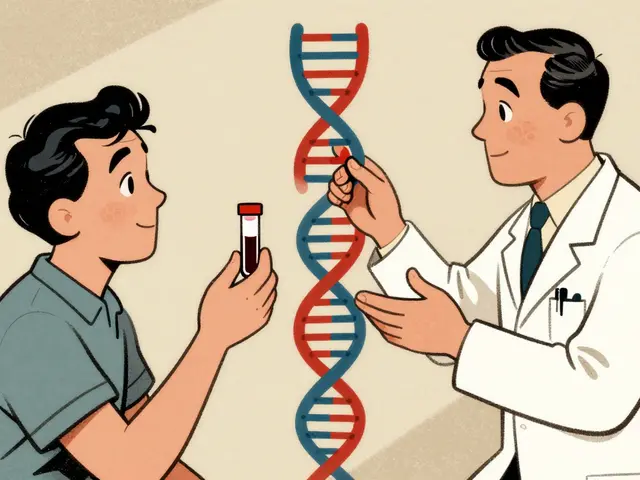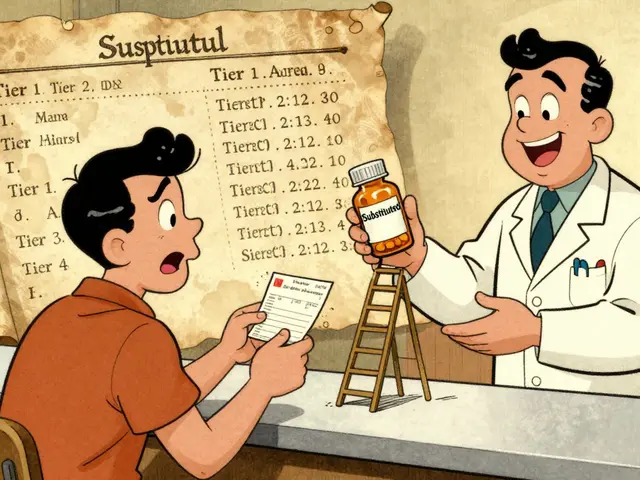Understanding Estriol and Its Role in the Body
Before we dive into the connection between estriol and weight loss, it's crucial to understand what estriol is and its role in our bodies. Estriol is one of the three primary estrogens produced by the human body, the other two being estradiol and estrone. It is mainly produced during pregnancy, and its levels tend to be much lower in non-pregnant women.
Estrogens, including estriol, play a vital role in various bodily functions such as regulating the menstrual cycle, maintaining healthy bones, and preserving cardiovascular health. Additionally, hormones like estriol help maintain the balance of various other hormones in our bodies, which can impact our overall health and well-being.
The Connection Between Estriol and Weight Loss
Now that we have a basic understanding of estriol, let's explore its connection to weight loss. Several studies have suggested that there may be a link between estrogen levels, including estriol, and an individual's ability to lose weight. Estrogens have been found to play a role in regulating fat metabolism, as well as influencing our appetite and energy expenditure.
As we age, our estrogen levels naturally decline, which can lead to hormonal imbalances and weight gain, particularly in women. This is especially true during menopause when estrogen levels drop significantly. It's been suggested that increasing estriol levels in the body could potentially aid in weight loss by improving hormonal balance and optimizing fat metabolism.
Estriol Therapy: A Potential Weight Loss Solution?
Estriol therapy, a form of hormone replacement therapy (HRT), has been used to treat various symptoms of hormonal imbalances, particularly in menopausal women. It involves the use of bio-identical estriol to help balance estrogen levels in the body. Some studies have shown that estriol therapy may help in reducing body fat and promoting weight loss.
However, it's essential to note that estriol therapy is not a one-size-fits-all solution for weight loss, and its effectiveness can vary from person to person. It's crucial to consult with a healthcare professional before considering estriol therapy for weight loss, as they can help determine if it's an appropriate treatment option for you based on your individual needs and medical history.
Important Considerations for Estriol Therapy
If you're considering estriol therapy as a potential weight loss solution, it's essential to be aware of some critical considerations. First and foremost, estriol therapy should only be used under the guidance and supervision of a qualified healthcare professional. They can help determine the appropriate dosage and monitor your progress throughout the treatment.
It's also crucial to understand that estriol therapy is not without potential side effects. Some common side effects include bloating, breast tenderness, and mood swings. In some cases, estriol therapy may also increase the risk of certain health conditions, such as blood clots and certain types of cancer. Therefore, it's essential to weigh the potential benefits and risks of estriol therapy with your healthcare provider before starting treatment.
Alternative Strategies for Weight Loss
If estriol therapy is not suitable for you or if you're looking for alternative weight loss strategies, there are several other effective options to consider. A well-balanced diet, regular physical activity, and proper stress management are all crucial components of a healthy weight loss plan. In addition, some individuals may benefit from working with a registered dietitian or a certified personal trainer to develop a personalized weight loss plan.
For some people, weight loss medications or supplements may be an appropriate option, in conjunction with a healthy lifestyle. However, it's important to remember that these medications and supplements should only be used under the guidance of a healthcare professional and in combination with a healthy diet and exercise plan.
Final Thoughts on Estriol and Weight Loss
In conclusion, while there may be a connection between estriol and weight loss, it's essential to approach the idea of estriol therapy with caution and to consult with a healthcare professional before starting treatment. It's important to remember that there is no one-size-fits-all solution for weight loss, and a combination of a healthy diet, regular exercise, and proper stress management will likely yield the best results for most individuals.
Always prioritize your overall health and well-being above all else, and work closely with your healthcare provider to develop a weight loss plan that is both safe and effective for you.










Thank you for sharing this comprehensive overview of estriol and its potential role in weight management. It is reassuring to see the emphasis on consulting qualified healthcare professionals before initiating any hormone therapy. Maintaining hormonal balance, especially during menopause, can indeed influence metabolism and overall well‑being. I encourage anyone considering estriol treatment to discuss dosage, possible side effects, and lifestyle adjustments with their provider. Wishing all readers a safe and informed journey toward their health goals.
Wow, the connection between estriol and fat metabolism is fascinating! If you’re looking to boost your weight‑loss efforts, keeping estrogen levels in check could be a game‑changer. Pairing any hormonal strategy with regular cardio and a protein‑rich diet maximizes results. Stay motivated, track your progress, and remember that consistency beats quick fixes every time.
If you think popping estriol pills is a shortcut, you’re dangerously naive.
Indeed, the metabolic dance of hormones is as intricate as a kaleidoscope, and a balanced approach shines through. Embrace both science and sensible lifestyle tweaks to paint a healthier picture.
Sure, because adding a synthetic hormone is always “safe and effective” – just ignore the nuanced risk profile and the cascade of endocrine feedback loops. In clinical practice, we call that optimism with a side of denial.
When evaluating estriol as a therapeutic adjunct for weight loss, it is essential to first understand its pharmacokinetic properties and how they differ from estradiol and estrone. Estriol has a relatively short half‑life, which means serum concentrations fluctuate more rapidly and may require more frequent dosing to maintain a stable hormonal milieu. Clinical trials have demonstrated that, in post‑menopausal women, low‑dose estriol can modestly improve insulin sensitivity, a key factor in adipose tissue storage and mobilization. Moreover, estriol interacts with estrogen receptor beta preferentially, which is thought to confer a more favorable cardiovascular profile while still exerting metabolic effects. In addition to these biochemical considerations, the psychosocial context cannot be overlooked. Many women experience mood swings and sleep disturbances during menopause, and these factors independently affect appetite regulation and energy expenditure. By potentially alleviating such symptoms, estriol therapy might indirectly support healthier eating patterns and increased physical activity. However, the heterogeneity of study designs – varying dosages, routes of administration, and treatment durations – makes it difficult to draw definitive conclusions about its weight‑loss efficacy. Another layer of complexity involves the interplay between estriol and the gut microbiome. Emerging evidence suggests that estrogen metabolism is partially mediated by intestinal bacteria, which can modulate the bioavailability of circulating hormones. Adjustments in diet that promote microbial diversity could therefore enhance the therapeutic impact of estriol. Conversely, antibiotic use or dysbiosis may blunt its benefits. Safety considerations remain paramount. While estriol is generally regarded as having a lower risk of endometrial hyperplasia compared to more potent estrogens, it is not devoid of adverse events. Reported side effects include mild breast tenderness, bloating, and in rare cases, venous thromboembolism. Long‑term data on oncologic outcomes are still limited, prompting clinicians to weigh risks versus benefits on an individual basis. In practice, a multidisciplinary approach that combines low‑dose estriol, personalized nutrition, resistance training, and behavioral counseling yields the most reliable outcomes. Regular monitoring of hormone levels, lipid profiles, and glucose tolerance tests ensures that therapy remains both effective and safe. Ultimately, estriol should be viewed as a potential adjunct rather than a standalone solution for weight loss, integrated within a comprehensive, evidence‑based lifestyle program.
One must ask whether the pursuit of slenderness through hormonal manipulation reflects a deeper societal obsession with aesthetic conformity rather than authentic health. While the data may be compelling, the moral calculus of commodifying our endocrine system for vanity remains profoundly troubling.
Great read!!! This article really shines a light on a topic that’s often overlooked!!! I love how it balances scientific detail with practical advice!!! Keep spreading the knowledge and empowering others to make informed health choices!!!
Thank you for your enthusiastic endorsement. The inclusion of empirical evidence alongside actionable recommendations is indeed commendable. 😊 It is my hope that readers will approach estriol therapy with both curiosity and caution, ensuring that clinical guidance underpins any decision. 🙏
When considering hormone replacement therapy it is vital to first assess baseline hormone levels through reliable laboratory testing without which any intervention is built on speculation the variability in individual metabolism can lead to divergent outcomes and therefore a personalized dosing regimen is recommended the literature suggests that low dose estriol may improve lipid profiles and insulin sensitivity but these effects are often modest and not universally observed the risk profile, though generally favorable compared to stronger estrogens, still includes potential venous thromboembolic events and rare cases of endometrial hyperplasia thus a thorough discussion with a knowledgeable clinician is indispensable regular follow up with blood work and symptom tracking allows for timely adjustments and ensures that therapeutic goals remain aligned with patient safety long term adherence benefits from integrating lifestyle modifications such as balanced nutrition regular aerobic exercise and stress reduction techniques the synergy of these approaches may enhance the overall efficacy of estriol therapy and support sustainable weight management
The premise you presented is fundamentally flawed because estriol does not magically melt fat you cant ignore the basic energy balance equation we all learned in school It’s not just about hormone levels but caloric intake versus expenditure anything else is just hype definetly not a silver bullet
Bottom line: if you’re thinking about estriol, start with a solid foundation-balanced meals, consistent workouts, and a check‑up with your doctor. Keep tracking, stay active, and remember that hormones are just one piece of the puzzle. You’ve got this!